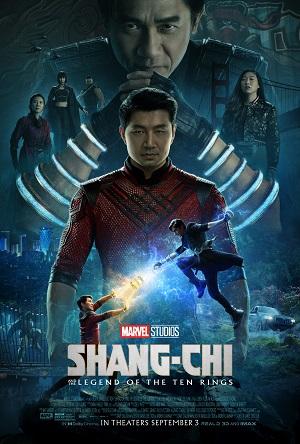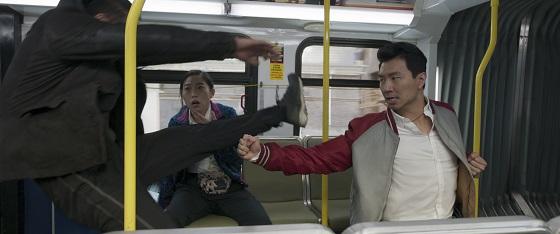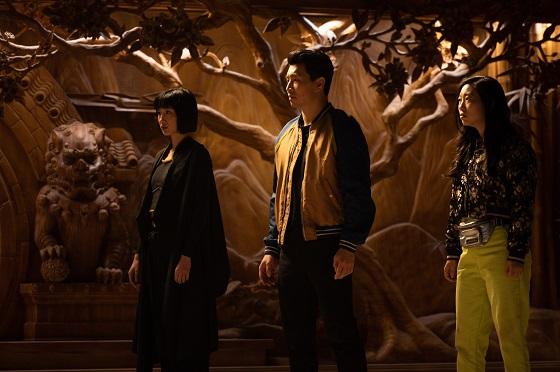

[Rating: Solid Rock Fist Up]
In theaters September 3.
Marvel Studios knows how to make a superhero movie by now, so it should come as no surprise that the newest pylon in its sprawling cinematic universe hits all the right notes on the action, suspense, drama, and character mythology scale. Shang-Chi and the Legend of the Ten Rings is an origin story for yet another gifted individual who must overcome personal demons, embrace fantastic gifts for the greater good, and maybe save the world, yet it succeeds where others have faltered due to its vice-like grip on the larger Marvel formula and an embrace of genre. And while the leads of this film are new to the scene, the film’s deployment of them within a larger cinematic framework with 20+ installments in the bank gives the franchise a running start that most don’t enjoy.
Even so, Shang-Chi has a fair amount of exposition at the top, introducing Wenwu (Tony Leung) in the opening minutes as an ancient Chinese warlord whose discovery of ten mystical rings grant him superhuman strength and longevity. For something like 1000 years, Wenwu uses the rings to amass power, wealth, and influence, only slowing down in 1996 when he meets a woman, Jiang Li (Fala Chen), from a magic Chinese forest (big time Crouching Tiger, Hidden Dragon vibes, here). The ease with which Jiang defeats the mighty Wenwu in hand-to-hand combat finds the warlord absolutely smitten, and before long the pair elope and have a couple of children.
The film then jumps ahead to the present day, catching up with the couple’s eldest, Shang-Chi (Simu Liu), who is living in San Francisco as “Shaun” and working a valet gig with his childhood best friend, Katy (Awkwafina). Katy doesn’t know much about Shang’s life before middle school, accepting him as her fellow 20-something platonic life-mate, yet she experiences a rude awakening on this front when assassins appear looking to snatch a jade necklace from her buddy. A blistering action scene and an information-dump later, the pair are in Macau searching for Shang’s long-lost sister, Xialing (Meng’er Zhang), who also has a jade necklace and may be on deck for a similar ambush.

If all of this sounds vaguely familiar, it’s because at its core, Shang-Chi and its eponymous lead follow a similar character roadmap that many of Marvel’s other notable marquee names have. Like Tony Stark, Bruce Banner, Thor, and even Peter Quill, Shang has a gift or superpower that he’s running from, only to get sucked back into some life-or-death drama that forces him to embrace his past and own the thing that sets him apart. Hell, there’s even some daddy issues thrown in for good measure to make this even more recognizable.
The best Marvel movies don’t succeed because they buck trends, per se, but because they lean into and improve upon what works, and that’s where Shang-Chi excels. This starts by bringing some of the MCU’S best fight choreography this side of Winter Soldier to the table, embracing the story’s Chinese roots with crisp and kinetic martial arts sequences. The deployment of some cracking Wushu aside, the action is both creative and fun as well, making wonderful use of surrounding environments and even Katy on a few occasions to raise stakes and keep the audiences engaged throughout what could have easily been a simple series of kicks and punches.
The script by Dave Callaham, Andrew Lanham, and director Destin Daniel Cretton also deploys small breadcrumbs throughout Shang-Chi that stitch the film into the wider MCU fabric without tedious crossover sections that serve as little more than backdoors into larger franchises. Characters talk about the consequences of Thanos’ snap, and grapple with the reality of a world with Ant, Iron, and Spider Men, integrating the known elements of the established MCU into this story with ease. And while there are cameos and appearances from other Marvel films in this one (none of which will be spoiled here), they never overpower the story or bring the focus away from Shang, Katy, and Xialing’s journey.

And that’s a good thing, because Liu, Leung, Awkwafina and the rest of the cast don’t need any help: to a person, they all kill it in their roles. Liu’s steely resilience and resolve find a good balance in the actor’s seemingly effortless portrayal of a young man torn between two worlds (with equal time given to both sides of that divide). Playing something of a straight man to Awkwafina’s comedy relief, Liu sets himself and the franchise up well for future installments that will no doubt build on this inviting yet imposing performance.
That said, like most Marvel movies, things get a little fuzzy near the end, when civilization-threatening creatures emerge from behind the CGI veil to interact with actors pretty obviously sweating in front of a green screen. Cretton struggles to establish a good sense of space and place in the climax and seems to reinvent what the Ten Rings can and can’t do from scene to scene. It is somewhat bewildering at times, but ultimately most of these issues can be written off to the more mystical elements of the story (like Doctor Strange, when in doubt about something, chalk it up to “magic”).
And that’s fine; this is a comic book movie featuring superheroes doing superhero shit using a Kung Fu genre subtext. If a person is going to be put off by magic rings, dragons, arm-swords, and chicken-pigs, they probably wouldn’t have bought a ticket to this one in the first place. A strong narrative backbone buttressed by solid performances, slam-bang martial arts sequences, and surprisingly emotional character thru-lines set Shang-Chi in the upper-mid-echelon of Marvel films, and keeps it moving at a jaunty pace throughout its 132-minute runtime. And while the film doesn’t reinvent the Marvel wheel, it keeps it spinning well enough to usher the universe into its fourth phase, where Iron Men and Black Widows can no longer steer the ship (and if Shang-Chi is any indication, they don’t need to).





Comments on this entry are closed.